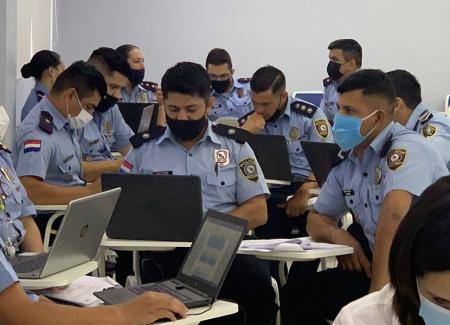Attaining Lasting Change (ATLAS)
Print
The ATLAS project builds the capacity of governments to combat child labor, forced labor, and human trafficking by helping them strengthen their laws, regulations, and enforcement efforts and enhance coordination between law enforcement and social protection entities. After completing the implementation and institutionalization of interventions in Argentina, Thailand, and Paraguay in 2022, ATLAS will continue working in Liberia to help develop a new child labor law and advocate for its passage. The project will also support the dissemination, implementation, and institutionalization of best practices in support of labor laws and policies recently approved by the Government of Liberia.
The Problem
Child labor, forced labor, and human trafficking are abusive labor practices that provide an unfair advantage to countries and their producers that fail to comply with their trade-related labor commitments and/or internationally recognized labor standards. These abusive labor practices could harm workers and businesses in the United States as they are competing with products made by children and/or workers in forced labor, including as a result of human trafficking. Gaps in countries’ labor and criminal legal frameworks, weak enforcement of labor and criminal laws, and a lack of coordination among law enforcement and social protection entities create vulnerabilities leading to labor exploitation of children and adults.
Our Strategy
The ATLAS project works to increase the capacity of governments in Thailand, Paraguay, Liberia, Argentina, and Bolivia to reduce child labor, forced labor, and human trafficking by helping them to:
- strengthen labor and/or criminal legal frameworks concerning child labor, forced labor, and/or human trafficking;
- improve enforcement of labor and/or criminal legal frameworks, specifically related to child labor, forced labor, and/or human trafficking; and
- increase coordination among law enforcement and social protection entities to address child labor, forced labor, and/or human trafficking.
This work involves identifying roles and responsibilities of government and other relevant stakeholders; mapping existing social protection programs and coordination systems, processes, and activities; assessing gaps and weaknesses in existing coordination within and among law enforcement and social protection entities; and establishing or improving the existing coordination framework.
Results
- The ATLAS project conducted global research, producing a Body of Knowledge that analyzed evidence on the effectiveness of programs, initiatives, and practices to address child labor, forced labor, and human trafficking, with a focus on enforcement in labor and criminal systems. The project also prepared country-specific pre-situational analysis reports and then worked with both government and non-governmental actors in each project country, utilizing the findings from the Body of Knowledge, to select how best to address the enforcement and/or coordination challenges identified in the country’s pre-situational analysis report.
- The project has successfully trained more than 280 local law enforcement officials in Thailand, Paraguay, and Liberia through its Enforcement Training Program, which educates labor inspectors, law enforcement, prosecutors, judges, and other government and civil society workers on enforcing labor laws and investigating and prosecuting labor and trafficking crimes.
- The ATLAS project participated in consultations held by the Liberian Ministry of Labor to propose draft language to update Liberia’s 2005 Anti-Human Trafficking Law. The draft law was passed by the Liberian Congress in September 2021, and it is now awaiting the President’s signature. The project also worked to support passage of updated Hazardous and Light Work Lists by the Ministry of Labor in 2022.
For more information on project activities by country, see the linked fact sheets: Global; Thailand; Paraquay; Liberia; Argentina
Other ATLAS resources: Winrock International > ATLAS Resources
Related Learnings
Learn About Our Success

Child labor, forced labor, and human trafficking are illegal in most countries. But laws often go unenforced because police do not understand the crimes, know how to identify them, or are unaware of proper procedures to follow.
- Grantee:
- Winrock International
- Implementing Partners:
- Lawyers Without Borders, Partners for the Americas
- Contact Information:
- GlobalKids@ilab.dol.gov / (202) 693-4843 / Office of Child Labor, Forced Labor, and Human Trafficking (OCFT)
- Tags:
- Child Labor
- Capacity Building
- Enforcement
- Forced Labor
- Human Trafficking
Related Project Resources
- Breaking a Vicious Cycle
- Combined Enforcement Training Program Presentations
- Master Enforcement Training Program - Enforcing Labor and Criminal Law to Address Child Labor, Forced Labor, and Human Trafficking - Facilitator's Guide
- Manual de Capacitacion para el Abordaje Integral del Trabajo Infantil, Trabajo Forzoso, Trata de Personas
- Paraguay Differentiated Models of Practice - Coordination Concept Papers
- Procedimientos Interinstitucionales en TI, TF y TP
- Body of Knowledge on Legislative, Enforcement, and Coordination Efforts: Collating Quality Evidence to Better Address Child Labor, Forced Labor, and Human Trafficking.
- Bolivia: In-depth Legislative Assessment Child Labor, Forced Labor, and Human Trafficking
- ATLAS Table of Proposed Amendments
- ATLAS Progress Report Highlights. Period Covered: January 1, 2019 - June 30, 2020.
- ATLAS Quarterly Progress Report. Period Covered: July 1, 2020 - September 30, 2020.
- Guidance document for police officers
- Light work and hazardous work list pocket guide
- Labour inspectors pocket guide on trafficking in persons
- Guidance document for labour inspectors
- Labour inspectors light work and hazardous work pocket guide
- Police officers pocket guide on trafficking in persons
